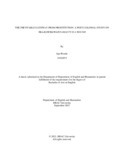| dc.contributor.advisor | Noman, Abu Sayeed Mohammad | |
| dc.contributor.author | Risalat, Iqra | |
| dc.date.accessioned | 2022-06-20T03:54:41Z | |
| dc.date.available | 2022-06-20T03:54:41Z | |
| dc.date.copyright | 2021 | |
| dc.date.issued | 2021-09 | |
| dc.identifier.other | ID 19103073 | |
| dc.identifier.uri | http://hdl.handle.net/10361/16999 | |
| dc.description | This thesis is submitted in partial fulfillment of the requirements for the degree of Bachelor of Arts in English, 2021. | en_US |
| dc.description | Cataloged from PDF version of thesis. | |
| dc.description | Includes bibliographical references (pages 69-73). | |
| dc.description.abstract | In a capitalist society, where commodification knows no boundary, commodifying sexual intercourse is a genius strategy to augment the advent of capitalism since sexual desire and its fulfillment is indispensable to the biological need of human beings. This is tied to their fundamental needs which they will seek to meet at any cost. In monogamous society this need is often met outside of marriage via prostitutes. When the same requirement is in high demand in a post-colonial society, and the country is in political and economic turmoil, the exit from the life of a sex-worker is unimaginable. It is the combination of all the existing preconditions that force the economically dependent women to be confined within the horrors of this institution. The lack of realistically alternative choices victimizes innocent lives and leaves them with no viable options. This situation has been intricately portrayed by Eka Kurniawan in the novel Beauty is a Wound. This paper seeks to scrutinize these preconditions and the power these institutions hold over an individual to understand why it is not always up to the individual to choose a path. This paper will investigate from a postcolonial perspective, and in addition, will also focus on communist ideas in light of prostitution. Since a long period of time, communists had a well-built network in the lands on Indonesia and its influence have shaped the social and political circumstances to an extent. Although ultimately communist ideas had to see its way out, the possibility of what might have happened otherwise to these prostitutes have been discussed in the paper. | en_US |
| dc.description.statementofresponsibility | Iqra Risalat | |
| dc.format.extent | 73 pages | |
| dc.language.iso | en | en_US |
| dc.publisher | Brac University | en_US |
| dc.rights | Brac University theses are protected by copyright. They may be viewed from this source for any purpose, but reproduction or distribution in any format is prohibited without written permission. | |
| dc.subject | Prostitution | en_US |
| dc.subject | Communism | en_US |
| dc.subject | Postcolonialism | en_US |
| dc.subject | Social preconditions | en_US |
| dc.subject | Magic realism | en_US |
| dc.subject | Identity | en_US |
| dc.subject.lcsh | Feminism. | |
| dc.subject.lcsh | Mothers and daughters -- Fiction. | |
| dc.subject.lcsh | Prostitutes -- Fiction. | |
| dc.subject.lcsh | Families -- Fiction. | |
| dc.title | The inevitable gateway from prostitution: a post-colonial study on Eka Kurniawan’s Beauty is a wound | en_US |
| dc.type | Thesis | en_US |
| dc.contributor.department | Department of English and Humanities, Brac University | |
| dc.description.degree | B.A. in English | |

